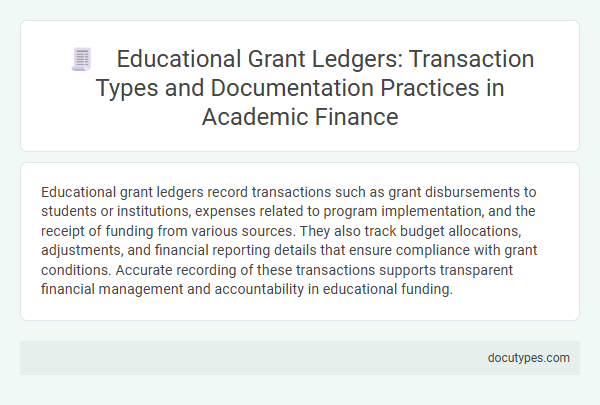Educational grant ledgers record transactions such as grant disbursements to students or institutions, expenses related to program implementation, and the receipt of funding from various sources. They also track budget allocations, adjustments, and financial reporting details that ensure compliance with grant conditions. Accurate recording of these transactions supports transparent financial management and accountability in educational funding.
Introduction to Educational Grant Ledgers
Educational grant ledgers serve as vital tools for tracking the financial activities related to grant funds. These ledgers help maintain transparency and accountability in managing educational resources.
- Grant Allocations - Records of the initial funds awarded to educational institutions or programs.
- Expenditures - Documentation of all spending related to approved grant activities and projects.
- Reimbursements and Adjustments - Entries reflecting refunds, corrections, or changes in grant funding balances.
Key Transaction Types in Academic Grant Management
| Transaction Type | Description | Importance in Grant Management |
|---|---|---|
| Grant Award Entries | Initial recording of awarded funds from educational institutions or funding bodies. | Establishes the baseline budget for academic programs and research projects. |
| Expenditure Transactions | Documentation of spent funds on allowable educational expenses such as salaries, equipment, and supplies. | Ensures compliance with grant terms and accurate tracking of fund utilization. |
| Budget Adjustments | Modifications in allocated amounts within approved categories or shifts between budget lines. | Maintains fiscal control and aligns spending with evolving academic priorities. |
| Fund Transfers | Movement of funds between different grant accounts or departments within the educational institution. | Facilitates flexibility in resource allocation across various academic projects. |
| Revenue Recognition | Recording of income generated through grant-related activities or matching funds. | Provides transparency in total funding available for academic initiatives. |
| Reimbursement Claims | Entries related to requesting payment for expenses already incurred under the grant. | Supports cash flow management and compliance with funder reimbursement policies. |
| Closeout Entries | Final adjustments and reconciliations when a grant period ends or a project completes. | Ensures accurate financial reporting and proper closure of grant accounts. |
Documentation Standards for Grant Transactions
Educational grant ledgers record all financial transactions related to the receipt and use of grant funds. These include allocations, expenditures, transfers, and adjustments for each grant awarded.
Documentation standards require that every transaction is supported by verifiable records such as invoices, receipts, and approval forms. Your records must clearly detail the date, purpose, amount, and authorization of each transaction. Maintaining accurate and complete documentation ensures compliance with funding regulations and facilitates transparent auditing processes.
Tracking Expenditures in Educational Grant Ledgers
Educational grant ledgers primarily record transactions related to the allocation and utilization of grant funds. These entries include detailed tracking of expenditures tied to specific educational programs or projects funded by the grants.
Key transactions involve payments for supplies, salaries for grant-funded staff, and costs of educational services or materials. Accurate recording in the ledger ensures compliance with funding guidelines and helps monitor budget adherence throughout the grant period.
Revenue Recording Methods for Grant Funding
Educational grant ledgers record transactions such as the receipt of grant funds, allocation of funds to specific projects, and expenses incurred under the grant. Revenue recording methods include cash basis, where funds are recorded upon receipt, and accrual basis, which recognizes revenue when earned regardless of payment timing. These methods ensure accurate tracking of grant funding to support financial accountability and compliance with grant requirements.
Compliance and Audit Requirements in Grant Documentation
Educational grant ledgers record various types of transactions, including grant awards, disbursements, expenses, and budget adjustments. These transactions must be meticulously documented to meet compliance standards set by funding agencies and regulatory bodies.
Your grant documentation should reflect accurate and timely entries of all financial activities to facilitate effective auditing processes. Maintaining detailed records supports transparency and ensures adherence to federal and institutional audit requirements.
Digital Tools for Managing Grant Ledgers
What types of transactions are recorded in educational grant ledgers? These ledgers document grant disbursements, expenditures, and budget adjustments related to educational funding. Digital tools enhance accuracy by automatically tracking transactions, ensuring compliance with grant requirements, and providing real-time updates for Your financial management.
Best Practices for Data Integrity in Academic Finance
Educational grant ledgers document various financial transactions to ensure accurate tracking of funds allocated for academic purposes. Maintaining data integrity in these records is essential for compliance and effective budget management.
- Grant Disbursements - Records of funds released to departments or projects track the flow of educational grants accurately.
- Expenditure Entries - Detailed logs of spending maintain accountability for how grant money is utilized in academic programs.
- Revenue Recognition - Entries noting the receipt of grant funds ensure timely and correct reporting of income for educational financing.
Implementing regular audits and strict access controls helps protect Your academic finance data's accuracy and reliability.
Common Challenges in Grant Ledger Maintenance
Educational grant ledgers document various transactions including grant awards, budget allocations, expenditure tracking, and reimbursement requests. Common challenges in maintaining these ledgers involve ensuring accurate data entry, reconciling discrepancies between budgets and actual spending, and timely updating of transaction records. You must establish robust oversight procedures and regular audits to address these challenges effectively and ensure compliance with funding requirements.
What Types of Transactions Are Recorded in Educational Grant Ledgers? Infographic

